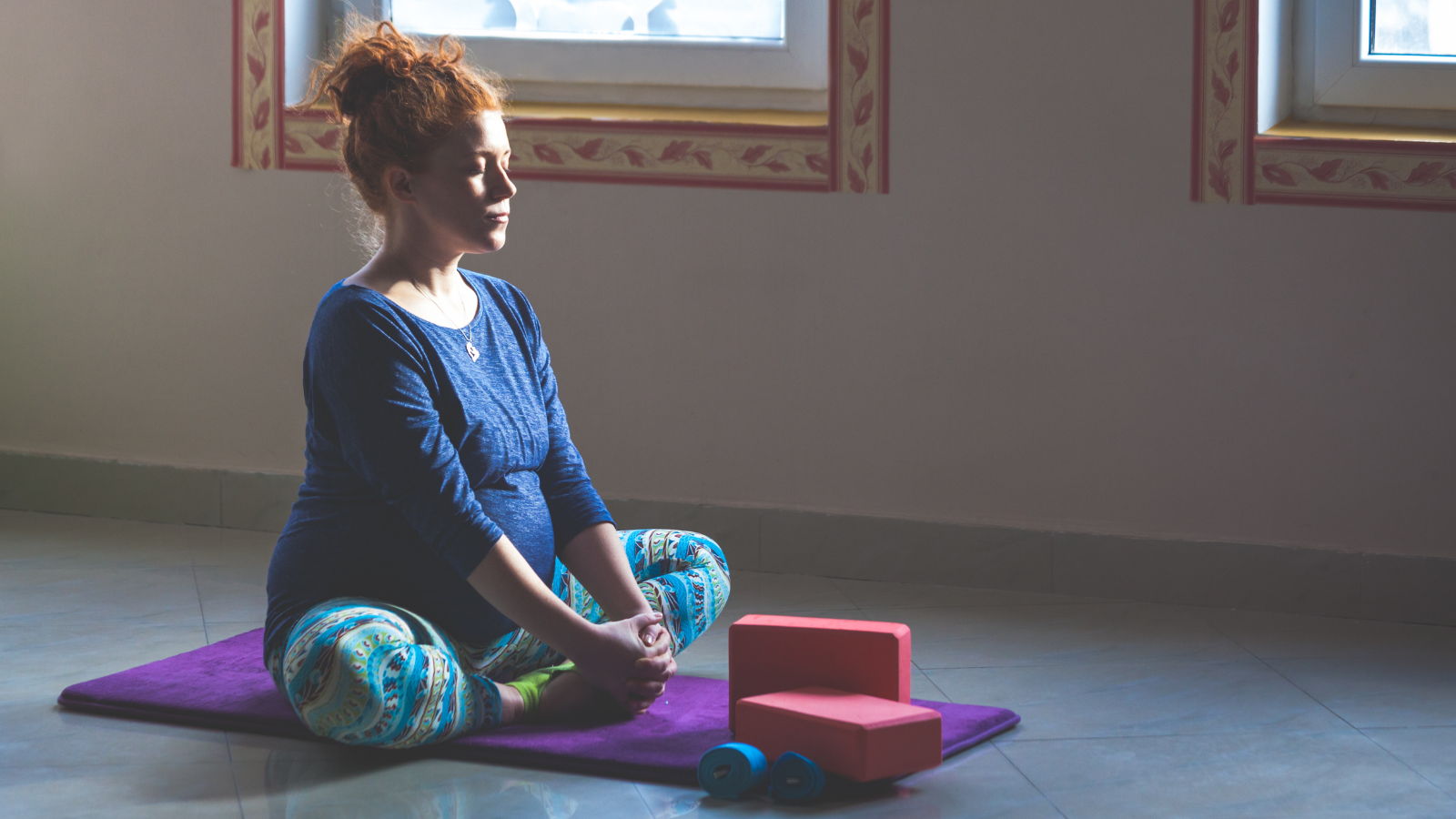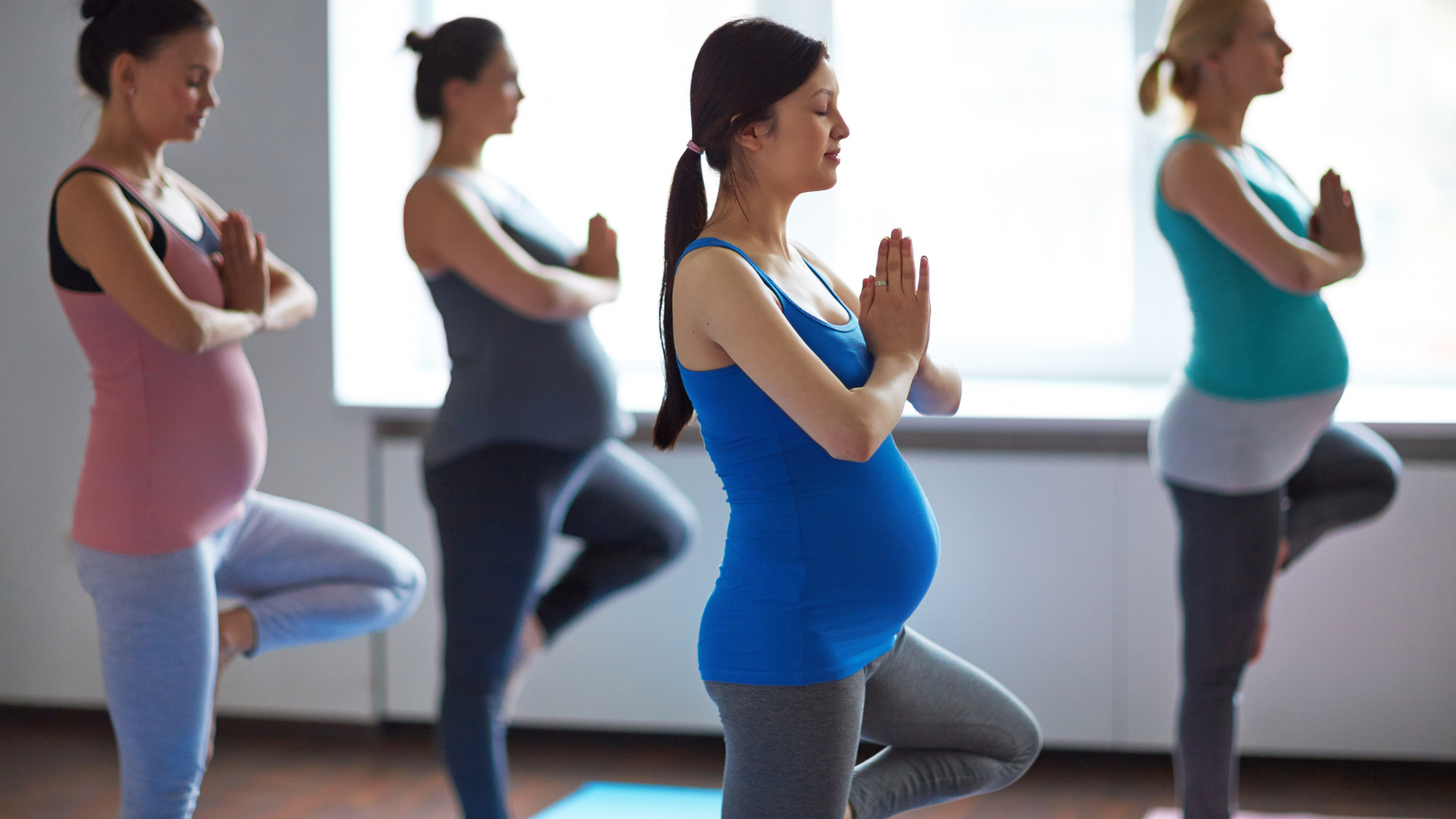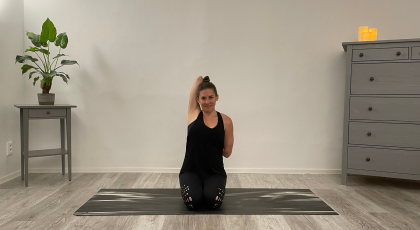View basket (0 items $0.00)

Prenatal Yoga: Not a One-Size-Fits-All Practice
Pregnancy doesn’t have to be a time for growing aches and pains. Instead, it can be a time of self-growth and discovery of our bodies’ innate capabilities. As many pregnant people can confirm, prenatal yoga can help with this process. But are prenatal yoga classes appropriate for all bodies? This article investigates the merits, risks, research, and practical considerations related to the practice.
Benefits of Prenatal Yoga

Whether or not you sign up for a prenatal class, yoga offers clear benefits during pregnancy. For example, a systematic review published in 2012 found that practicing yoga during pregnancy indicated a significant reduction in rates of preterm labor, intrauterine growth restriction, low birth weight, pregnancy discomfort, perceived sleep disturbances, and perceived stress (1). This study also suggested that practicing yoga while pregnant improved quality of life in terms of physical wellbeing (1).
Although fewer studies have been published on prenatal yoga than on regular yoga practice during pregnancy, prenatal yoga is the only style of yoga that is designed specifically for pregnant people. One study published in BMC Pregnancy and Childbirth found that young pregnant women’s participation in twice-weekly prenatal yoga classes was associated with decreased self-reported distress and increased perceived skills to assist with labor and childbirth (2). Finally, a qualitative research study found that prenatal yoga classes may especially draw in pregnant women experiencing stress and depression (3). This study also found that participants perceived prenatal yoga to be both psychologically and physically beneficial during pregnancy (3).
Nonetheless, compared to the smorgasbord of Vinyasa classes that may be available, the offerings for prenatal yoga classes may seem slim. The fact is that prenatal yoga is a niche style designed for a niche audience, meaning there may only be one or two classes each week at your local yoga studio—that is, if your local studio is lucky enough to even be able to offer prenatal yoga classes. This may leave seasoned practitioners wondering if they should simply stick with their favorite teachers’ classes throughout their pregnancies rather than devoting themselves to prenatal yoga classes. On the flip side, it may cause pregnant people who are brand new to yoga to question whether prenatal yoga classes may be too physically challenging for them.
Who is Prenatal Yoga Designed For?

One quality that makes many prenatal yoga classes distinct from other styles of yoga is that they are often designed to be gentle and accessible to beginners. The pace of prenatal yoga classes is frequently slower than a typical Vinyasa class. What’s more, the sequencing is targeted to the sources of comfort that may be felt in later stages of the pregnancy, such as sensitivity in the low back, pelvis, and hips.
Sometimes, it may feel that prenatal yoga classes may be targeted to pregnant people who are later into their third trimester. In other words, instructors may teach to the most pregnant in the room. Nonetheless, the cueing in prenatal classes is applicable to every pregnant person who shows up, because it may enable them to prepare for what is to come at a later stage of their pregnancy.
Who Should Not Practice Prenatal Yoga?

Despite being widely acceptable to beginners and all shapes of pregnant bodies, there are a few exceptions to who may benefit from participation. For pregnant people with high-risk conditions, there may be instances when even gentle movement may cause more harm than good. Thus, before signing up for your first prenatal yoga class, you should check with your healthcare provider if you have preeclampsia, gestational diabetes, heart or lung disease, placenta previa, a history of miscarriage, or any other health issue that may concern you.
Additionally, it may not be the best time to take a prenatal class if any red flags come up during pregnancy. For example, if you experience sharp abdominal pain, vaginal bleeding, severe back pain, severe dizziness, severe headache, sudden swelling in the face or hands, decreased fetal movement, or premature rupture of membranes, it’s safest to seek immediate guidance from your medical provider rather than your yoga teacher. That is not to say that pregnant people shouldn’t do yoga at all if complications arise, but yoga practices in which the body can rest, such as gentle diaphragmatic breathing and meditation, may be the safest option.
Other Prenatal Yoga Considerations

For pregnant people who have been cleared by their providers to participate in prenatal yoga classes, there may still be some lingering concerns about finding the right class. For example, sometimes the only times that prenatal classes are offered don’t fit into your busy schedule. Or maybe the one prenatal teacher at your studio simply doesn’t resonate with you. Not all teachers are for everyone, and not all classes will become a part of your routine—and that’s okay. In these instances, it may be beneficial to seek out online offerings from qualified prenatal yoga teachers.
In other cases, if you’re a seasoned yoga practitioner, you may not be eager to substitute your vigorous daily practices with prenatal yoga seven days a week—and you don’t have to right away. As long as you’re listening to your body, you’ve learned how to safely modify your yoga practice, and you’ve told your teacher that you’re expecting, it’s okay to continue attending all-levels yoga classes during pregnancy. But what may be better is to find a balance of practicing with your favorite teachers and practicing prenatal yoga.
Recommendations
Prenatal yoga is one-size-fits-most, but there are some important health and personal factors that should be taken into account before signing up for class. All bodies are different, and all pregnancies are different. To decide what works best for you, seek out your health care provider’s guidance, explore the options of virtual and in-person offerings, and, above all else, listen to your body when practicing yoga.
 Lacey Gibson Ramirez is a Boston-based ERYT-200 yoga teacher and a freelance writer. Through her teaching and writing, she seeks to make yoga accessible, inclusive, and equitable. Lacey has completed certifications in Prenatal Yoga and Barre as well as trauma-informed yoga trainings. Additionally, she holds a Masters of Science in Global Health and Population from Harvard T.H. Chan School of Public Health. To learn more and connect, visit her website laceygibson.com
Lacey Gibson Ramirez is a Boston-based ERYT-200 yoga teacher and a freelance writer. Through her teaching and writing, she seeks to make yoga accessible, inclusive, and equitable. Lacey has completed certifications in Prenatal Yoga and Barre as well as trauma-informed yoga trainings. Additionally, she holds a Masters of Science in Global Health and Population from Harvard T.H. Chan School of Public Health. To learn more and connect, visit her website laceygibson.com
References
-
Babbar, S., Parks-Savage, A. C., & Chauhan, S. P. (2012). American Journal of Perinatology, 29(06): 459-464. Retrieved from https://www.thieme-connect.de/products/ejournals/abstract/10.1055/s-0032-1304828
-
Styles, A., Loftus, V., Nicolson, S., & Harms, L. (2019). Prenatal yoga for young women a mixed-methods study of acceptability and benefits. BMC Pregnancy and Childbirth, 19(449). Retrieved from https://bmcpregnancychildbirth.biomedcentral.com/articles/10.1186/s12884-019-2564-4
-
Kinser, P., & Masho, S. “Yoga Was My Saving Grace”: The Experience of Women Who Practice Prenatal Yoga. Journal of the American Psychiatric Nurses Association, 21(5):319-26. Retrieved from https://www.ncbi.nlm.nih.gov/pubmed/26511433
Featured Courses









